Fleurs du Mal Magazine


Marina Keegan (1989-2012) was an award-winning author, journalist, playwright, poet, actress, and activist.
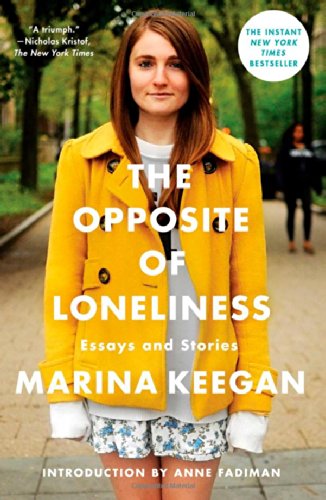
Her nonfiction has been published in The New York Times; her fiction has been published on NewYorker.com, and read on NPR’s Selected Shorts; her musical, Independents, was a New York Times Critics’ Pick. Marina’s final essay for The Yale Daily News, “The Opposite of Loneliness”, became an instant global sensation, viewed by more than 1.4 million people from 98 countries.
‘A generation-defining collection published posthumously…Her voice is relevant, sharp, fresh, unfiltered and poetic, with a dry wit. You can dive in and out of her questioning and her musings and meanderings. So much promise’, Jenna Coleman, star of Doctor Who and Victoria.
Marina Keegan’s star was on the rise when she graduated from Yale in May 2012. She had a play that was to be produced at the New York International Fringe Festival and a job waiting for her at the New Yorker. Tragically, five days after graduation, Marina died in a car crash.
As her family, friends and classmates, deep in grief, joined to create a memorial service for Marina, her unforgettable last essay for the Yale Daily News, ‘The Opposite of Loneliness’, went viral, receiving more than 1.4 million hits.
She had struck a chord. Even though she was just 22 when she died, Marina left behind a rich, expansive trove of prose that, like her title essay, captures the hope, uncertainty and possibility of her generation. The Opposite of Loneliness is an assemblage of Marina’s essays and stories that articulates the universal struggle we all face as we work out what we aspire to be and how we can harness our talents to make an impact on the world.
The Opposite of Loneliness:
Essays and Stories
by Marina Keegan (Author),
Anne Fadiman (Introduction)
Publisher: Scribner,
Simon & Schuster Ltd
First Edition (April 8, 2014)
Language: English
240 pages
ISBN-10 : 147675361X
ISBN-13 : 978-1476753614
Price: Paperback € 19,99
Marina Keegan (1989-2012)
American author, playwright, journalist, actress and poet
Born: Marina Evelyn Keegan
October 25, 1989
Boston, Massachusetts
Died: May 26, 2012 (aged 22)
Cape Cod (USA)
Alma mater; Yale University
The Opposite of Loneliness:
Essays and Stories (2014)
American literature
For more information, visit: TheOppositeofLoneliness.com
• fleursdumal.nl magazine
More in: #Biography Archives, #Editors Choice Archiv, - Book News, Archive K-L, Archive K-L, In Memoriam, Marina Keegan, THEATRE
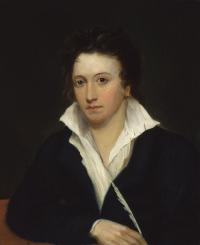
Love’s Philosophy
The fountains mingle with the river
And the rivers with the Ocean,
The winds of Heaven mix for ever
With a sweet emotion;
Nothing in the world is single;
All things by a law divine
in one spirit meet and mingle.
Why not I with thine?-
See the mountains kiss high Heaven
And the waves clasp one another;
No sister-flower would be forgiven
If it disdained its brother;
And the sunlight clasps the earth
And the moonbeams kiss the sea:
What is all this sweet work worth
If thou kiss not me?
Percy Bysshe Shelley
(1792 – 1822)
Love’s Philosophy
• fleursdumal.nl magazine
More in: Archive S-T, Archive S-T, Shelley, Percy Byssche
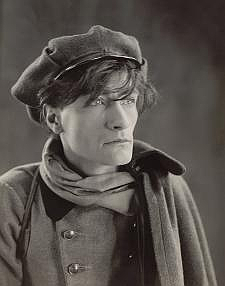
Poème Révolte contre la poésie
Nous n’avons jamais écrit qu’avec la mise en incarnation de l’âme,
mais elle était déjà faite, et pas par nous-mêmes,
quand nous sommes entrés dans la poésie.
Le poète qui écrit s’adresse au Verbe et le Verbe a ses lois.
Il est dans l’inconscient du poète de croire automatiquement à ces lois.
Il se croit libre et il ne l’est pas.
Antonin Artaud
(1896 – 1948)
Poème Révolte contre la poésie
• fleursdumal.nl magazine
More in: Antonin Artaud, Archive A-B, Archive A-B, Artaud, Antonin

She Walks in Beauty
She walks in beauty, like the night
Of cloudless climes and starry skies;
And all that’s best of dark and bright
Meet in her aspect and her eyes:
Thus mellow’d to that tender light
Which heaven to gaudy day denies.
One shade the more, one ray the less,
Had half impair’d the nameless grace
Which waves in every raven tress,
Or softly lightens o’er her face;
Where thoughts serenely sweet express
How pure, how dear their dwelling-place.
And on that cheek, and o’er that brow,
So soft, so calm, yet eloquent,
The smiles that win, the tints that glow,
But tell of days in goodness spent,
A mind at peace with all below,
A heart whose love is innocent.
Lord Byron
(1788 – 1824)
She Walks in Beauty
• fleursdumal.nl magazine
More in: Archive A-B, Archive A-B, Byron, Lord
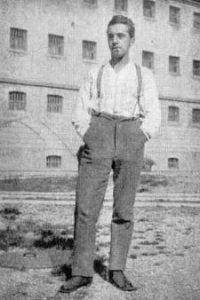
Nacht
Zinnoberroter Traum emporreißt unterdrückte Lust,
Die wandgeketteten verdammten Pritschen stöhnen,
O, nun auftauchen Bilder, die den kahlen Raum verschönen,
Der Dämon wühlt in unsrer Brust.
Erwachend höhnen, Kupplerinnen, uns die Eisengitter,
Im Morgengrauen sind die Zellen wie verweinte Mütter.
Ernst Toller
(1893 – 1939)
Nacht
• fleursdumal.nl magazine
More in: Archive S-T, Archive S-T, Toller, Ernst
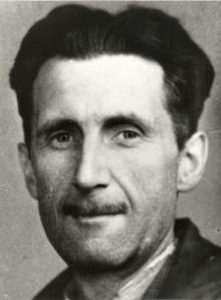
Our Minds Are Married,
But We are Too Young
Our minds are married, but we are too young
For wedlock by the customs of this age
When parent homes pen each in separate cage
And only supper-earning songs are sung.
Times past, when medieval woods were green,
Babes were betrothed, and that betrothal brief.
Remember Romeo in love and grief—
Those star-crossed lovers—Juliet was fourteen.
Times past, the caveman by his new-found fire
Rested beside his mate in woodsmoke’s scent.
By our own fireside we shall rest content
Fifty years hence keep troth with hearts desire.
We shall remember, when our hair is white,
These clouded days revealed in radiant light.
George Orwell
(1903 – 1950)
Our Minds Are Married, But We are Too Young
• fleursdumal.nl magazine
More in: Archive O-P, Archive O-P, George Orwell, Orwell, George, Romeo & Juliet
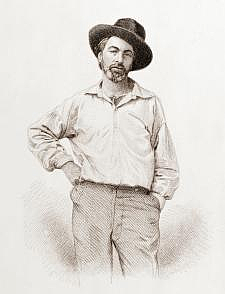
Among the Multitude
Among the men and women the multitude,
I perceive one picking me out by secret and divine signs,
Acknowledging none else, not parent, wife, husband, brother, child,
any nearer than I am,
Some are baffled, but that one is not–that one knows me.
Ah lover and perfect equal,
I meant that you should discover me so by faint indirections,
And I when I meet you mean to discover you by the like in you.
Walt Whitman
(1819 – 1892)
Poem: Among the Multitude
• fleursdumal.nl magazine
More in: Archive W-X, Archive W-X, Whitman, Walt

Being your slave,
what should I do but tend
Being your slave, what should I do but tend
Upon the hours and times of your desire?
I have no precious time at all to spend,
Nor services to do, till you require.
Nor dare I chide the world-without-end hour
Whilst I, my sovereign, watch the clock for you.
Nor think the bitterness of absence sour
When you have bid your servant once adieu;
Nor dare I question with my jealous thought
Where you may be, or your affairs suppose,
But like a sad slave, stay and think of nought,
Save, where you are how happy you make those.
So true a fool is love that in your will
Though you do anything, he thinks no ill.
William Shakespeare
(1564 – 1616)
Being your slave, what should I do but tend
Sonnet 57
• fleursdumal.nl magazine
More in: Archive S-T, Archive S-T, Shakespeare, William

Begegnung in der Zelle
Die Dinge, die erst feindlich zu dir schauen,
Als wären sie in Späherdienst gezwängte Schergen,
Sie laden dich zu Fahrten ein gleich guten Fergen,
Und hegen dich wie schwesterliche Frauen.
Es nähern sich dir all die kargen Dinge:
Die schmale Pritsche kommt, die blauen Wasserkrüge,
Der Schemel flüstert, daß er gern dich trüge,
Die Wintermücken wiegen sich wie kleine Schmetterlinge.
Und auch das Gitterfenster kommt, das du verloren,
Mit Augen, die sich an den schwarzen Stäben stachen,
Anstarrtest, während deine Arme hilflos brachen,
Und Köpfe der Erschoßnen wuchsen aus versperrten Toren.
Das Gitterfenster ruft: Nun, Lieber, schaue, schaue,
Wie ich aus Wolken dir ein Paradies erbaue.
Ernst Toller
(1893 – 1939)
Begegnung in der Zelle
• fleursdumal.nl magazine
More in: Archive S-T, Archive S-T, Toller, Ernst

La rue
La rue sexuelle s’anime
le long de faces mal venues,
les cafés pepiant de crimes
deracinent les avenues.
Des mains de sexe brûlent les poches
et les ventres bouent par-dessous;
toutes les pensees s’entrechoquent,
et les tetes moins que les trous.
Antonin Artaud
(1896 – 1948)
La rue
• fleursdumal.nl magazine
More in: Antonin Artaud, Archive A-B, Archive A-B, Artaud, Antonin, Psychiatric hospitals

Guerre
Rameau central de combat
Contact par l’écoute
On tire dans la direction ‘ des bruits entendus ‘
Les jeunes de la classe 1915
Et ces fils de fer électrisés
Ne pleurez donc pas sur les horreurs de la guerre
Avant elle nous n’avions que la surface
De la terre et des mers
Après elle nous aurons les abîmes
Le sous-sol et l’espace aviatique
Maîtres du timon
Après après
Nous prendrons toutes les joies
Des vainqueurs qui se délassent
Femmes Jeux Usines Commerce
Industrie Agriculture Métal
Feu Cristal Vitesse
Voix Regard Tact à part
Et ensemble dans le tact venu de loin
De plus loin encore
De l’Au-delà de cette terre
Guillaume Apollinaire
(1880 – 1918)
Guerre
• fleursdumal.nl magazine
More in: *Concrete + Visual Poetry A-E, Apollinaire, Guillaume, Archive A-B, Archive A-B, Guillaume Apollinaire
Ton van Reen schreef onder meer romans, kinder- en jeugdboeken en journalistiek werk.
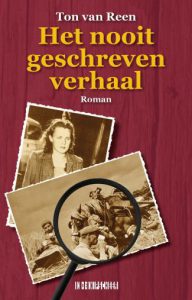 Bekend zijn de romans Het winterjaar, Roomse meisjes en Concert voor de Führer. Gestolen jeugd is het ware verhaal van jongens en mannen die aan het eind van de Tweede Wereldoorlog als dwangarbeiders naar Duitsland werden gevoerd. De lichtverkoper werpt licht op een donker tijdperk in de geschiedenis van de kinderarbeid in de negentiende eeuw. De verdwenen stad is de werdegang van een advocaat. Dochters is het levensverhaal van een journalist in Afrika. Katapult is een verhaal over gewone mensen in roerig Amsterdam in de vorige eeuw. De bende van de bokkenrijders werd verfilmd tot een veelbekroonde tv-serie. In Frankrijk spelen zijn boeken Vlucht uit Montaillou, Bevroren dromen, Landverbeuren en In het spoor van de camisards.
Bekend zijn de romans Het winterjaar, Roomse meisjes en Concert voor de Führer. Gestolen jeugd is het ware verhaal van jongens en mannen die aan het eind van de Tweede Wereldoorlog als dwangarbeiders naar Duitsland werden gevoerd. De lichtverkoper werpt licht op een donker tijdperk in de geschiedenis van de kinderarbeid in de negentiende eeuw. De verdwenen stad is de werdegang van een advocaat. Dochters is het levensverhaal van een journalist in Afrika. Katapult is een verhaal over gewone mensen in roerig Amsterdam in de vorige eeuw. De bende van de bokkenrijders werd verfilmd tot een veelbekroonde tv-serie. In Frankrijk spelen zijn boeken Vlucht uit Montaillou, Bevroren dromen, Landverbeuren en In het spoor van de camisards.
Ton van Reen over het ontstaan van zijn nieuwe roman:
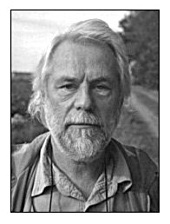 “Zestig jaar geleden werkte ik als leerling-verpleger in Psychiatrisch Ziekenhuis Ursula in Wassenaar. Drie avonden in de week bezocht ik de avond-HBS in Den Haag. Bij thuiskomst kwam ik vaak, op eigen verzoek, in de nachtdienst terecht.
“Zestig jaar geleden werkte ik als leerling-verpleger in Psychiatrisch Ziekenhuis Ursula in Wassenaar. Drie avonden in de week bezocht ik de avond-HBS in Den Haag. Bij thuiskomst kwam ik vaak, op eigen verzoek, in de nachtdienst terecht.
Vaak had ik lange gesprekken met patiënten die slecht sliepen. Er was een man die mij het verhaal vertelde over een misdaad die hij niet had begaan maar waarvoor hij de schuld op zich had genomen. Uit liefde. Daarna belandde hij lange jaren in de gevangenis.
Zijn verhaal bleef mijn leven lang in mijn hoofd hangen. Ik wilde het ooit opschrijven. Het kwam er nooit van.
Het drama had zich afgespeeld in een kloosterdorp, in Brabant of Limburg, zoals Velp bij Grave, of Steijl bij Tegelen. Tot ik opeens besefte dat er ook zo’n dorp met een psychiatrische inrichting bij mij in de buurt lag. Koningslust, een kerkdorp van de gemeente Helden waar zich een deel van mijn jeugd had afgespeeld. Een dorp dat mede ontstaan was door het klooster dat er in 1849 was gesticht door de Broeders van Sint Joseph.
Alles viel op zijn plek. Ik had een handvat om het verhaal waarvan ik alleen de kern kende, op te schrijven. Het verhaal had ik zestig jaar geleden gehoord en het speelde zestig jaar eerder, rond 1900. Ik besloot het in deze tijd te plaatsen. Het is immers een verhaal van alle tijden. De kern, over de man die zich opoffert uit liefde, blijft.”
Ton van Reen
Het nooit geschreven verhaal
Roman
Vormgeving omslag Carmen Arends
Gebrocheerd in omslag
240 blz.
Uitgeverij In de Knipscheer
ISBN 978-94-93214-68-2
Eerste uitgave maart 2022
€ 19,50
• fleursdumal.nl magazine
More in: - Book News, - Bookstores, Archive Q-R, Archive Q-R, Psychiatric hospitals, Reen, Ton van, Reen, Ton van, Ton van Reen
Thank you for reading Fleurs du Mal - magazine for art & literature